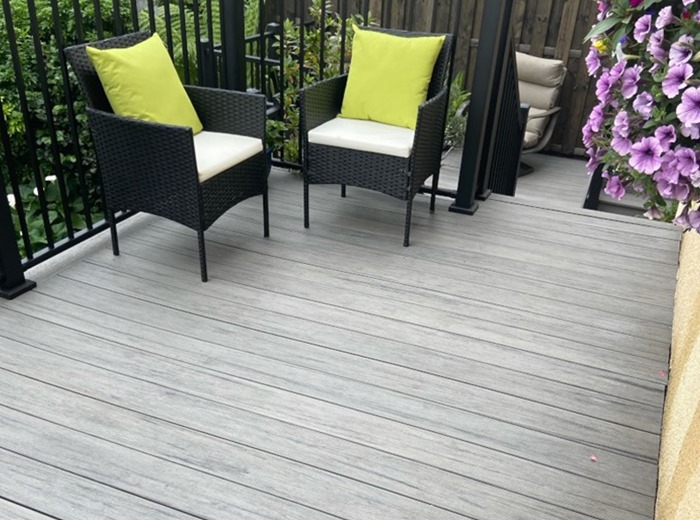
If you're thinking about investing in a composite deck for your garden, you'll want to know how long it's going to last and whether it's going to rot. After all, when you choose composite decking, you investing in a high-quality product that comes with a slightly higher price tag than the cheap plastic or wooden decking on the market. It's true that you get what you pay for when it comes to decking, so if you choose composite decking over other cheaper options, then you can guarantee that your deck will look good and last longer.
But will it rot? The short answer is no. Composite decking is designed in such a way that it won't rot, even if it's in damp conditions for long periods of time. Today we're going to explain what composite decking is, how it's made, and why it's the number 1 choice if you want a deck that won't rot. So, if you're thinking about adding composite decking to your garden, just keep reading.
How is composite decking made?
The manufacturing processes involved in creating composite decking are quite complex, but the final product is worth it! Here at DeckPlus, we believe in using as many eco-friendly raw materials as we can. So, the wood fibers that make the core of our composite deck boards come from cut-offs that would've otherwise ended up in a landfill. Similarly, the plastics that we use to create the durable polymer coating come from post-industrial and post-production sources. This means that we can create responsible deck boards without compromising on quality.
Once we've gathered all of the necessary raw materials, we can start creating our deck boards. There are two different ways to create composite decking, these are:
- Extrusion - where the wood fiber and polymer resins are combined with lubricants, colouring agents, and foaming agents before being extruded to create the desired shape.
- Compression moulding - where the manufacturer tips the raw materials into a machine that compresses them and forms them into shape under extreme heat and pressure.
Whichever manufacturing method is used, the composite deck boards that are produced boast the best qualities of both wood and plastic decking. They have the beauty and strength of wood decking and the waterproof and rotproof qualities of plastic decking. This means that when you choose composite decking, you really are getting the best of both worlds!
Read More: How is Composite Decking Made?
Why doesn't it rot?
If you've heard horror stories about decking rotting away after only a few years, there's probably a very specific reason for that. The type of decking that's prone to rot is wood decking. Wood is a natural material that's incredibly porous and it expands and contracts in line with the changing temperatures. In order to prevent wood decking from rotting, it needs to be well maintained. This includes sanding, staining, and (most importantly) sealing the wood so that water and dirt can't make their way into the wood grain.
The reason why wood decking is so prone to rot is that people don't give it the care it needs. If the wood is exposed to the elements for a long time, water ingress will eventually start to happen. As water makes its way into the deck boards, the dark, damp conditions become ideal for rot. If this problem is not dealt with quickly, the rot can spread throughout your deck boards, and before you know it, the whole thing will be weak and in a state of disrepair!
Composite decking is much more robust and requires a tiny fraction of the maintenance, which is why it's the perfect option for homeowners who want a low-maintenance deck that won't rot. Our composite deck boards consist of a composite core with a water-resistant polymer coating on the faces. This polymer coating is the main reason why composite decking doesn't rot. It's completely waterproof and prevents any kind of water from penetrating the boards. It also protects the boards and preserves the finish and colour, so you'll never need to sand, stain, or seal your composite deck boards.
If you've been thinking about adding composite decking to your garden, we hope this blog has helped to reassure you that it's a good investment. Here at DeckPlus, we offer a wide range of composite decking to suit all budgets - all of which are designed not to rot! You can shop our extensive range of composite decking below.
Shop Composite Decking Now >